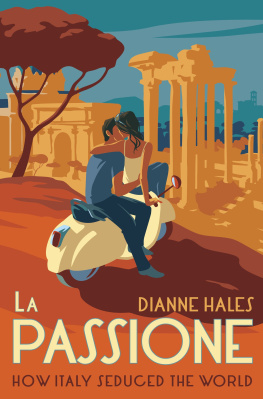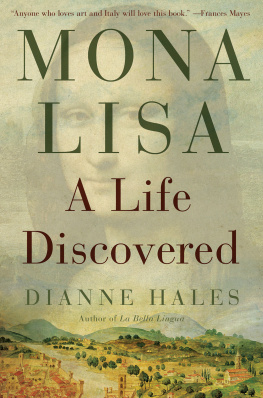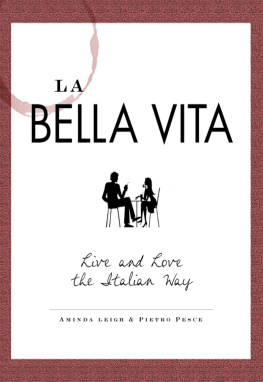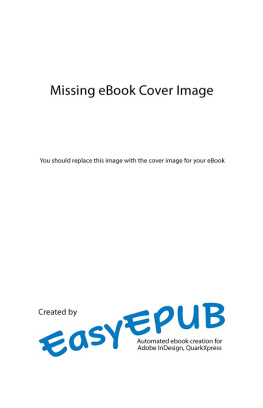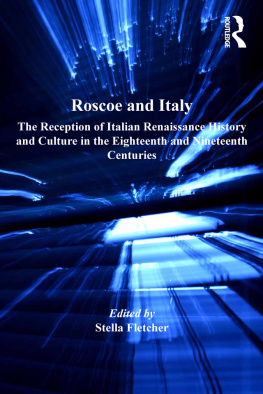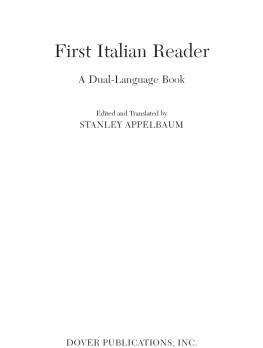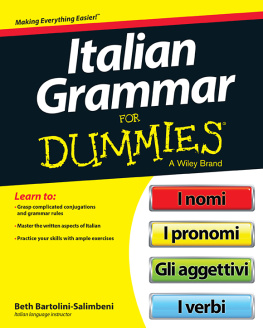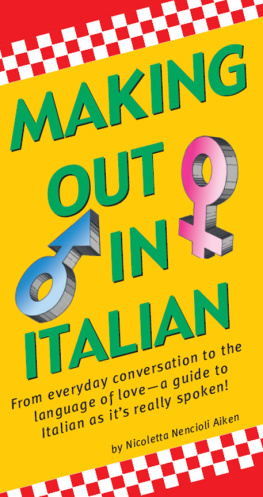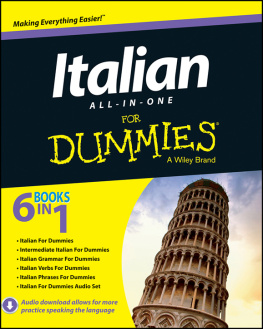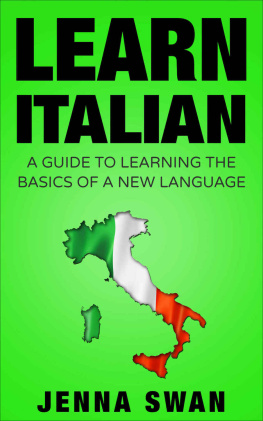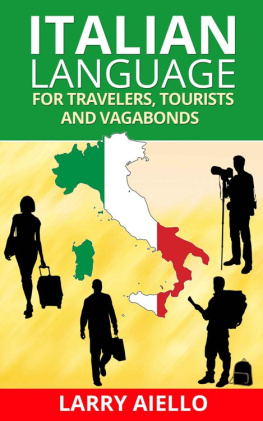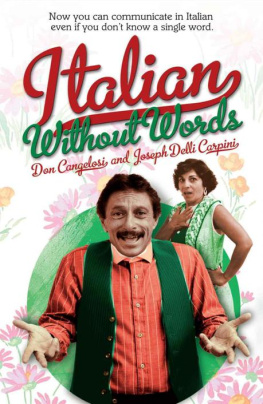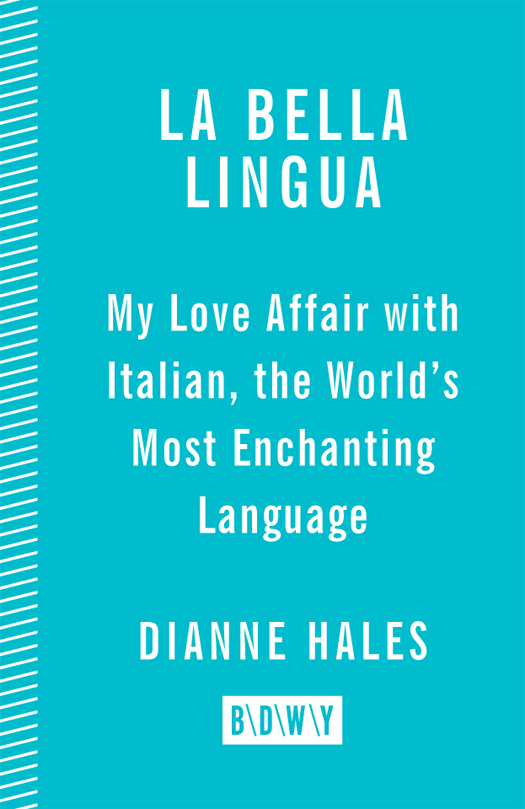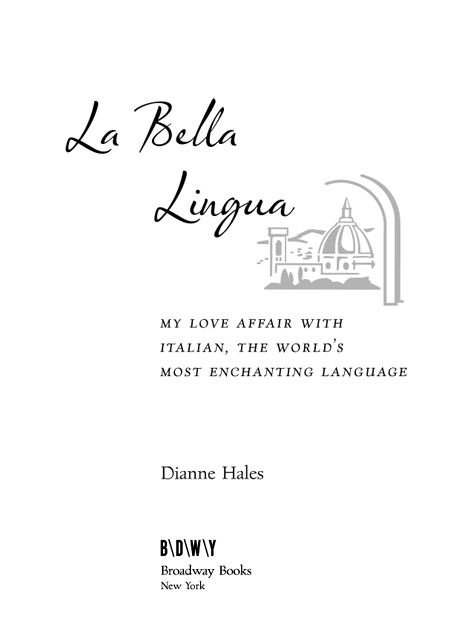Acknowledgments
Grazie. Grazie tanto. Grazie mille. Vi ringrazio.
I wish there were more ways to say thank you to the many, many people who helped me with La Bella Lingua.
I am most grateful to my collaborator, tutor, and coach, Alessandra Cattani, proprio un tesoro. I wouldnt have been able to pull off this bella sfida (lovely challenge) without her creativity, vast knowledge, endless patience, and good humor. Our mutual friend Francesca Gaspari, director of San Franciscos ItaLingua Institute, first ignited my passion for Italian with her vivacious zest for her native tongue. I send un abbraccio forte to Cristina Romanelli of the Societ Dante Alighieri in Florence, who brought the history of Italian to life for me.
Many distinguished champions of the language were extremely generous with their knowledge and time. I was honored to meet and interview Francesco Sabatini of LAccademia della Crusca, Ambassador Bruno Bottai of the Societ Dante Alighieri (La Dante), and Luca Serianni of La Sapienza in Rome. I became a fan of Valeria della Valle and Giuseppe Patota after reading their lucid books on Italians history and usage, but my admiration has soared since meeting them. I truly consider myself their humble allieva (pupil), and I thank Valeria for the very special gift of her friendship. I am particularly indebted to the amiable Lucilla Pizzolli of La Dante, who provided books, contacts, explanations, and enthusiasm. I also want to thank Alessandro Masi and Raffaella Fiorani of La Dante and Delia Ragionieri and Paolo Belardinelli of La Crusca.
Many others served as my faculty in Florence, including Contessa Maria Vittoria Rimbotti, Enrico Paoletti of the local Societ Dante Alighieri, Professors Ernestina Pellegrina and Massimo Fanfani of the University of Florence, Philip Taylor of Polimoda Institute, Pamela Pucci of the Florence tourism office, and Ignazio Leone of Libri dArte. A heartfelt grazie to Rita, Antonella, Annalisa, Daniel, and the entire staff at Palazzo Magnani Feroni, who made me feel a mio agio in Florence.
I am thankful to Ludovica Sebregondi and Maestro Mario Ruffini for everything they taught me about art and opera, but most of all for the delight of their company and the joy of their friendship. The same holds true for Maestro Maurizio Barbacini and his wife, Antonella. In San Francisco, Kip Cranna of the San Francisco Opera and Luciano Chessa further enhanced my musical education.
I learned to appreciate the language of Italian cinema with the help of Gianfranco Angelucci, Sergio Raffaeli, Maurizio di Rienzo, Tullio Kezich, and the helpful staff at Romes Casa del Cinema. I owe much of my knowledge of Italian cuisine to Guido Tommasi of Guido Tommasi Editore; Gabriella Ganugi of Apicius, the Culinary Institute of Florence; Luca and Francesco Bracali of the fabulous Ristorante Bracali in Ghirlanda Massa Marittima; poet and food historian Luigi Ballerini; and Leonardo Fasulo of Osteria Fasulo in Davis, California, whose food makes us feel that were eating in Italy. I am grateful to several women, among them Giulia Pirovano of the Camera Nazionale della Moda Italiana, Anna Fendi, and Elisa Roggiolani, and to David Mohammadi of San Franciscos Emporio Armani for all theyve taught me about Italian style.
Beppe Severgninis wit and insight deepened my appreciation of Italian and its speakers. The effervescent actor and dantista Roberto Benigni opened my eyes to an entirely new way of appreciating Dante. Vito Tartamella taught me more than I ever thought Id want to know about Italians parolaccia or bad language. Alberta Campitelli of Romes office of Beni Culturali provided an enchanting insiders view of the citys historic villas. Aldo Colonetti of the Istituto Europeo di Design greatly broadened my understanding of Italian design. I thank Raffaele Simone for the gift of his book and his perspective and Maurizio Borghi for introducing me to the works of Niccol Tommaseo. I add un bacio to Crescenzo, Andrea, and Simone DAmbrosio, whose much-missed father taught me some of my earliest Italian phrases.
My research in the United States began at the Istituto Italiano di Cultura di San Francisco, where I was fortunate to find Annamaria Lelli, Valeria Rumori, and the aptly named Robin Treasure. Elisabetta Nelsen of San Francisco State University was a rich source of ideas and insights. Carol Field, both through our talks and her books, provided a wealth of information on Italian cooking and cooks.
I also thank Stefania Scotti, my conversation and literature teacher for several years, for preparing me for my first research trip to Italy and her husband, Federico Rampini, for helping me identify sources. My thanks also go to my other Italian teachers, including Lorenza Graziosi, Valeria Furino, and Tony Sottile. Among others in the Bay Area who contributed to my research are Carla Falaschi; Lido Cantarutti of the Marin Italian Film Festival; Caterina Feucht, Armando di Carlo, and Steven Botterill of the University of California, Berkeley; Carla Melchior; Paola Sensi-Isolani of St. Marys College; chef Daniel Scherotter of Palio dAsti restaurant in San Francisco; and Sandow Birk and Marcus Sanders, coauthors of an illustrated contemporary version of the Divine Comedy. Grazie, also, to Judith Greber and the wonderful women of her writing group, who encouraged me to thinkand writeoutside the box.
The books and translations of Julia Conaway Bondanella and Peter Bondanella of the University of Indiana were invaluable resources, and I was even more appreciative of the mini-tutorial they gave me in Italian literature, history, and cinema. I also am grateful for the assistance of Peter DEpiro and Mary Desmond Pinkowish, authors of Sprezzatura; Beverly Kahn and Aldo Belardo of Pace University; Valerie Steele of the Museum of the Fashion Institute of Technology; Paul Salerni of Lehigh University; and Traci Timmons of the Seattle Art Museum.
Italian translates friendship as amicizia, but I learned its true meaning from Roberto and Carla Serafini, who served as my first Italian instructors and taught me so much about language, food, history, and their beloved Rome. Other dear friends, Andrea Fasola Bologna and his son, Lorenzo, modern reincarnations of true Renaissance men, welcomed my family into their magnificent home and their lives. I send baci e abbracci (kisses and hugs) to la mia cara amica Cinzia Fanciulli, another of my guides into Italian culture, and her ever-charming husband, Riccardo Mazurek. I am grateful to another Italian friend, Narriman Shahrokh, for her careful reading of the final manuscript.


